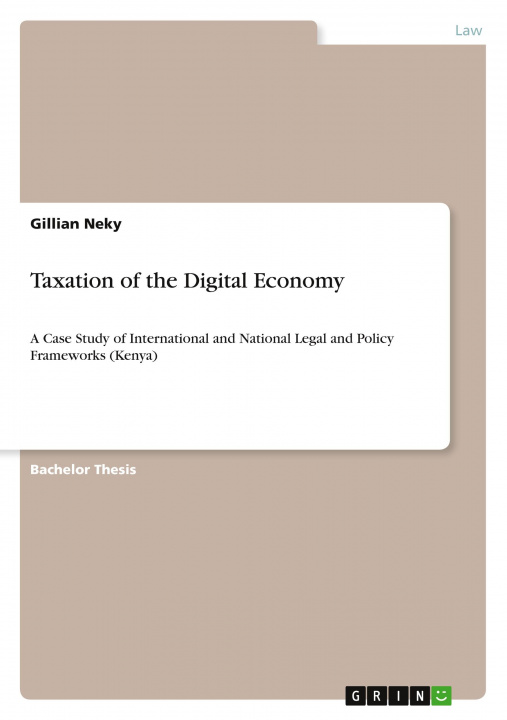
Livrare
Consilier de cumpărături





Nu se pretează? Nu contează! La noi puteți returna bunurile în 30 de zile
 Voucher cadou
orice valoare
Voucher cadou
orice valoare
Cu un voucher cadou nu veți da greș. În schimbul voucherului, destinatarul își poate alege orice din oferta noastră.
Taxation of the Digital Economy
 engleză
engleză
 198 b
198 b
30 de zile pentru retur bunuri


Bachelor Thesis from the year 2019 in the subject Law - Tax / Fiscal Law, grade: A, University of Nairobi (School of Law), course: Dissertation, language: English, abstract: This dissertation explores the concept of the digital economy, its rapid growth, and the tax challenges it has introduced, both locally and internationally. It examines the general characteristic of a sovereign state and its inherent right to tax source on income generated within its jurisdiction. The dissertation attempts to investigate the taxability of the digital economy where business is conducted without the requirement of a physical presence, a pre-requisite for tax administration. How can states and especially Kenya detect permanent establishment, for purposes of tax administration, for an economy that is heavily reliant on intangible assets and a business model based on data, network effects, and user-generated content. It therefore, focuses and looks at the scope of Kenya's legislative and policy frameworks and its effectiveness in taxing the digital economy.Digital businesses and especially multinational digital enterprises have been able to take advantage of the tax laws and policies that were written for an industrial age and are ill suited for today's digital economy. The Action Plan on Base Erosion and Profit Shifting, by the Organization for Economic Co- operation and Development set out to answer the fundamental issues of BEPS (aggressive tax avoidance planning strategies), but it in itself fell short of expectations as it was not able to recommend practical, implementable solutions that would close the gaps that exist in the digital economy tax administration. The findings revealed that BEPS is not a single problem faced by all states but states face different BEPS problems and evaluate them from their own state-centred perspectives. Hence, the development of many interim measures by different states to tax the digital economy as the international community is still trying to come to a consensus on the possible, practical solutions.The current Kenyan tax framework on taxation of the digital economy is obscure as only recent Bills tabled in Parliament try and address the issue in depth. In light of the findings of this research, it was established that the problem is not so heavy on laws and regulation on taxation of goods sold electronically, but rather, implementation of the applicable laws where they exist. The paper finally recommends possible amendments to the Kenyan legal framework and the proposed amendments are assessed by means of comparison with what has taken place in other jurisdictions.
Informații despre carte
 engleză
engleză




 Cum să cumpăr
Cum să cumpăr















